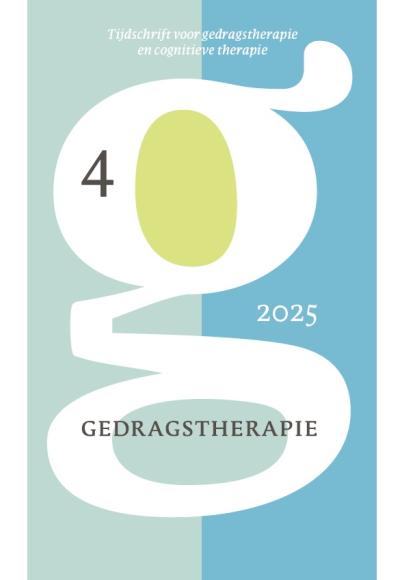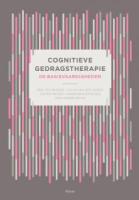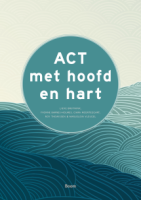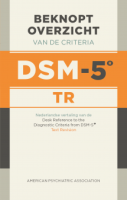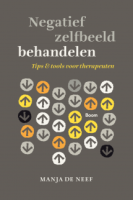Inhoud
Moeilijk afleren van angst vóór trauma voorspelt posttraumatische klachten
Samenvatting
Na een traumatische gebeurtenis ontwikkelen sommige mensen posttraumatische stressstoornis (PTSS). Eerdere onderzoeken toonden aan dat mensen met PTSS moeilijk angst afleren(‘extinctieleren'), maar het is onduidelijk of dit het gevolg is van de PTSS, of een factor is die al voorafgaand aan het trauma aanwezig was en iemand kwetsbaar maakt voor de ontwikkeling van PTSS. In deze prospectieve studie werd bij 249 militairen onderzocht of individuele verschillen in het afleren van een angst vóór een uitzending naar Afghanistan een voorspeller was voor posttraumatische klachten na de uitzending. Hierbij werd gecontroleerd voor klachten voorafgaand aan de uitzending en het aantal gerapporteerde stressoren tijdens uitzending. Resultaten laten zien dat het moeilijk afleren van een angst bijdraagt aan de kwetsbaarheid voor de ontwikkeling van PTSS klachten.
Literatuur
- American Psychiatric Association (2000). Diagnostic and statistical manual of mental disorders (4th ed., text revision). Washington, DC: American Psychiatric Association.
- Blechert, J., Michael, T., Vriends, N., Margraf, J., & Wilhelm, F.H. (2007). Fear conditioning in posttraumatic stress disorder: evidence for delayed extinction of autonomic, experiential, and behavioural responses. Behaviour Research and Therapy, 45, 2019-2033.
- Breslau, N., Kessler, R.C., Chilcoat, H.D., Schultz, L.R., Davis, G.C., & Andreski, P. (1998). Trauma and posttraumatic stress disorder in the community: The 1996 Detroit area survey of trauma. Archives of General Psychiatry, 55, 626-632.
- Craske, M.G., Kircanski, K., Zelikowsky, M., Mystkowski, J., Chowdhury, N., & Baker A. (2008). Optimizing inhibitory learning during exposure therapy. Behaviour Research and Therapy, 46, 5-27.
- Engelhard, I.M., Arntz, A., & Hout., M.A. van den (2007). Low specificity of symptoms on the post-traumatic stress disorder (PTSD) symptom scale: a comparison of individuals with PTSD, individuals with other anxiety disorders, and individuals without psychopathology. British Journal of Clinical Psychology, 46, 449-456.
- Engelhard, I.M., Jong, P.J. de, Hout, M.A. van den, & Overveld, M. van (2009). Expectancy bias and the persistence of posttraumatic stress. Behaviour Research and Therapy, 47, 887-892.
- Engelhard, I.M., & Hout, M.A. van den (2007). Preexisting neuroticism, subjective stressor severity, and posttraumatic stress in soldiers deployed to Iraq. Canadian Journal of Psychiatry, 52, 505-509.
- Engelhard, I.M., Hout, M.A. van den, Weerts, J., Arntz, A., Hox, J.J.C.M., & McNally, R.J. (2007). Deployment-related stress and trauma in Dutch soldiers returning from Iraq: Prospective study. British Journal of Psychiatry, 191, 140-145.
- First, M.B., Spitzer, R.L., Gibbon, M., & Williams, J.B. (1996). Structured Clinical Interview for DSM-IV Axis-I Disorders (SCID)(Clinical Version). American Psychiatric Press.
- Foa, E.B., Riggs, D.S., Dancu, C.V., & Rothbaum, B.O. (1993). Reliability and validity of a brief instrument for assessing post-traumatic stress disorder. Journal of Traumatic Stress, 6, 459-473.
- Hermans, D., Vansteenwegen, D., Crombez, G., Baeyens, F., & Eelen, P. (2002). Expectancy learning and evaluative learning in human classical conditioning: affective priming as an indirect and unobtrusive measure of conditioned stimulus valence. Behaviour Research and Therapy, 40, 217-234.
- Kleine, R.A. de, Hendriks, G.-J., Kusters, W. J.C., Broekman, T.G., & Minnen, A. van (2012). A randomized placebo-controlled trial of D-cycloserine to enhance exposure therapy for posttraumatic stress disorder. Biological Psychiatry, 71, 962-968.
- Orr, S.P., Metzger, L.J., Lasko, N.B., Macklin, M.L., Peri, T., & Pitman, R.K. (2000). De novo conditioning in trauma-exposed individuals with and without posttraumatic stress disorder. Journal of Abnormal Psychology, 109, 290-298.
- Peri, T., Ben-Shakhar, G., Orr, S.P., & Shalev, A.Y. (2000). Psychphysiologic assessment of aversive conditioning in posttraumatic stress disorder. Biological Psychiatry, 47, 512 519.
- Maguen, S., Litz, B.T., Wang, J.L., & Cook, M. (2004). The stressors and demands of peace keeping in Kosovo: predictors of mental health response. Military Medicine, 169, 198-206.
- Mineka, S., Oehlberg, K. (2008). The relevance of recent developments in classical conditioning to understanding the etiology and maintenance of anxiety disorders. Acta Psychologica, 127, 567-580.
 © 2009-2026 Uitgeverij Boom Amsterdam
© 2009-2026 Uitgeverij Boom Amsterdam
De artikelen uit de (online)tijdschriften van Uitgeverij Boom zijn auteursrechtelijk beschermd. U kunt er natuurlijk uit citeren (voorzien van een bronvermelding) maar voor reproductie in welke vorm dan ook moet toestemming aan de uitgever worden gevraagd:
Behoudens de in of krachtens de Auteurswet van 1912 gestelde uitzonderingen mag niets uit deze uitgave worden verveelvoudigd, opgeslagen in een geautomatiseerd gegevensbestand, of openbaar gemaakt, in enige vorm of op enige wijze, hetzij elektronisch, mechanisch door fotokopieën, opnamen of enig andere manier, zonder voorafgaande schriftelijke toestemming van de uitgever.
Voor zover het maken van kopieën uit deze uitgave is toegestaan op grond van artikelen 16h t/m 16m Auteurswet 1912 jo. Besluit van 27 november 2002, Stb 575, dient men de daarvoor wettelijk verschuldigde vergoeding te voldoen aan de Stichting Reprorecht te Hoofddorp (postbus 3060, 2130 KB, www.reprorecht.nl) of contact op te nemen met de uitgever voor het treffen van een rechtstreekse regeling in de zin van art. 16l, vijfde lid, Auteurswet 1912.
Voor het overnemen van gedeelte(n) uit deze uitgave in bloemlezingen, readers en andere compilatiewerken (artikel 16, Auteurswet 1912) kan men zich wenden tot de Stichting PRO (Stichting Publicatie- en Reproductierechten, postbus 3060, 2130 KB Hoofddorp, www.cedar.nl/pro).
No part of this book may be reproduced in any way whatsoever without the written permission of the publisher.
Inloggen VGCt en VVGT
Leden van de VGCt en de VVGT loggen in via de site van hun vereniging. Als u op die site bent ingelogd als lid, vindt u daar een button naar het Tijdschrift voor Gedragstherapie.
English
Behavioral Therapy: Journal for Behavioral Therapy and Cognitive Therapy ISSN 0167-7454
Information in English can be found here.



